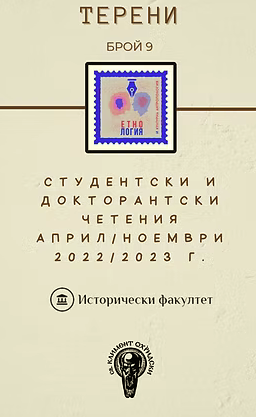Следвоенните режими в България и Румъния
поглед отвъд Атлантика в докладите на Марк Етридж
DOI:
https://doi.org/10.60053/TER.2024.9.154-170Abstract
The path of the post-war settlement with the former Nazi satellites from Eastern Europe is marked by the requirements of the Yalta Declaration for a Liberated Europe for the establishment of representative governments comprised of all democratic elements in these countries. In this respect, the coalition governments of Bulgaria and Romania, established at the end of the summer of 1944, faced the gravest problems in terms of their recognition by the western powers which naturally impeded the conclusion of their peace treaties. The authorities in the USA and Great Britain, two of the main allies in the anti-Nazi coalition, viewed Bulgaria and Romania as mere Soviet tools and did not recognize the democratic character and the representativeness of their governments, a fact which delayed their international recognition and the threatened the delay of the conclusion of peace treaties with them. In the course of the negotiations on the procedure for the elaboration of peace treaties with the former satellites of Nazi Germany, the American government dispatched the journalist Mark Ethridge as an independent observer to Bulgaria and Romania with the task to present a report in which to assess whether the governments in Sofia and Bucharest are sufficiently representative. Along with a brief biographical account of the American journalist, this article will present Ethridge's main findings and the political ramifications of its report. The morphing of his fact-
finding mission into a fully-fledged diplomatic effort and an attempt to influence the internal political scene of the two countries against the background of Soviet political dominance in them is also analyzed. Further, the paper will give an account of the analysis provided by Ethridge with regards to the similarities and differences between the regimes in Bulgaria and Romania.
References:
Statii, studii, monografii i memoarna literatura:
Baeva, I., E. Kalinova. Sledvoennoto desetiletie na balgarskata vanshna politika (1944 – 1955). S., 2013.
Zhignya, K. Imperialisticheskaya politika SShA i Velikobritanii v otnoshenii Bolgarii i Rumanii (1944 – 1947 gg.). Kishinev. 1981 g.
Pintev, S. Bulgaria v britanskata diplomatsia 1944 – 1947. S. 1998
Charchil, U. Memoari. T. 6 Triumf i tragedia. S. 1995. Churchill, W. Memoirs. Triumph and Tragedy. S. 1995.
Iz hroniki istoricheskih dney 1. maya 1944-6. marta 1945 gg. Volume 48 of Bibliotheca historica Romaniae: Etudes
Rieber, A. “The Crack in the Plaster: Crisis in Romania and the Origins of the Cold War,” Journal of Modern History 76.1 (March 2004), pp. 62–106.
Stone, D.R. The 1945 Ethridge Mission to Bulgaria and Romania and the Origins of the Cold War in the Balkans. In: Democracy and Statecraft Vol. 17 (2006): 93 – 112
Arhivni sbornitsi i masivi:
Arhiv vneshney politiki Rossiyskoy Federatsii – Fond 06
Aldoshin, V.V, Yu.V. Ivanov, Semenov, V.M, Sovetsko-Amerikanskie Otnoshenia 1945 – 1948 (red. Sevostyyanov, G.N.), M. 2004
Teheran, Yalta Potsdam. Treto dopalneno izdanie. Partizdat. Sofia, 1972
Tsentralen Darzhaven Arhiv - Fond 146 B, Opis. 2
Wilson Center Digital Archive. Yalta Conference Agreement of a Liberated Europe.
Foreign Relations of the United States (FRUS): Diplomatic Papers, 1945, Europe, Vol. V
Foreign Relations of the United States (FRUS): Diplomatic Papers, 1945, Europe, Vol. IV






